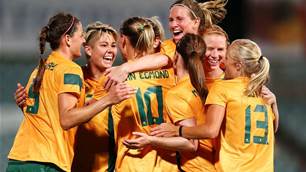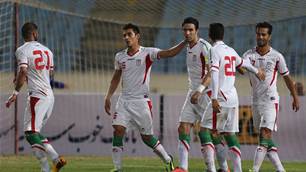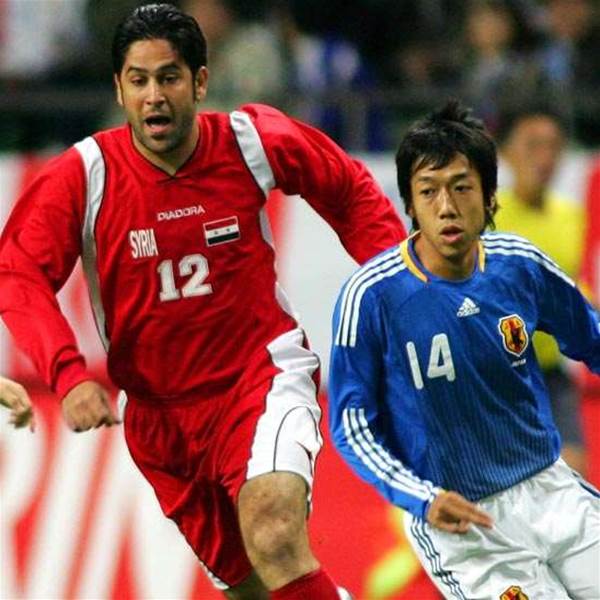POWERHOUSES Japan and Saudi Arabia should progress in a group containing minnows Syria and Jordan. However, if either of the unfancied west Asian nations manage to snag a win against the big guns of the group, it will blow qualification wide open.
Jordan
If the last year is anything to go by, Jordanians are in for one hell of a ride when their first Asian Cup game against Japan kicks-off on January 9.
12 months ago Jordan were rooted to the bottom of their Asian Cup qualifying group, having drawn with Thailand and lost to Singapore and Iran in their first three games. Portuguese coach Nelo Vingada was promptly replaced by Iraqi Adnan Hamad but all hope seemed to be lost as they faced top of the table Iran in a do-or-die clash at the King Abdullah International Stadium.
If a nation's footballing destiny can be changed by one moment, then Jordan will look back at Amer Deeb's 78th minute winner in that game as the turning point for their team. Not only did it secure a valuable three points, but it began the West Asian nation's ascent of Group E and a final day 2-1 victory over Singapore - coupled with a 90th minute winner by Iran which ended Thailand's qualification
hopes - saw 'Nashama' become the Asian Cup's most unlikely qualifiers.
Buoyed by only their second qualification for the tournament, Jordan continued their rich vein of form by crushing reigning Asian champions Iraq 4-1 and seeing off fellow qualifiers Bahrain 2-1.
However disappointment was to follow in the WAFF (West Asian Football Federation) Championships in September, where despite hosting the tournament, they could only manage two draws and crashed out in the group stage. Letting a two goal lead to Kuwait slip with half an hour to play in the second match proves coach Hamad still has much work to do.
As results against the Asian big guns have proven, Jordan certainly have the quality to mix it with the larger footballing nations. Striker Hassan Abdel-Fattah has shone for his country in recent months, helping himself to a brace in the ill-fated WAFF draw to Kuwait and developing a good relationship with fellow striker Odai Al-Saify.
20 year-old Deeb is another player coming to the fore in the Jordanian side, as his winning goal against Iran proved. The Al-Wahdat midfielder's strength is getting down the flanks and his ability to attack from deep-lying positions will be crucial as Jordan will undoubtedly be setting themselves up as a counter-attacking side, relying on their speed as a unit to get forward.
Defensively they have the personnel to play this way, led by keeper Amer Shafi, who played out of his skin in the 2004 finals, conceding only one goal from open play in four matches.
Star Man
Goalkeeper Amer Shafi was the hero of his country's 2004 Asian Cup run, keeping three clean sheets in the group stages before bowing out to eventual champions Japan in a penalty shootout. The 28 year-old is considered the best keeper in the Jordanian league and will need to be on top form to keep the likes of Saudi Arabia's Al-Qahtani and Japan's Honda off the scoresheet.
The Coach
Adnan Hamad - A former Iraqi national team striker, sacked by his home nation after failing to get them to the final stages of the 2010 World Cup qualification, Hamad then sparked Jordan's amazing qualification campaign that saw them transform from rock bottom easy-beats to last day qualifiers. The 49 year-old was the AFC Coach of the Year in 2004 after leading Iraq to the Olympic semis and will need to be at his inspirational best to guide 'Nashama' out of the group.
FourFourTwo predicts...
Jordan are the minnows of the group and it will take a herculean effort to see them progress from Group B. But if there's one thing the Jordanians have demonstrated over the last year, it's a never-say-die attitude. Opponents be warned: take Jordan lightly at your peril.
Jordan
Syria are one of the most intriguing sides to take the field in Qatar.
After a 15 year Asian Cup abscence, the West Asians were the only country to emerge from qualifcation undefeated, and although their group included the distinctly average Lebanon and Vietnam, their achievement shouldn't be taken lightly.
Taking four points from China over two legs is no mean feat in the heat of qualifying, and a 4-0 away dismantling of Lebanon to finish the campaign was just as impressive.
However, after the qualification success, the Syrian FA made the bold move of parting company with coach Fajer Ebrahim after some average performances. With a surprising 2-1 defeat at the hands of Yemen, the final nail in the coffin was a bottom of table finish at the WAFF Championships and leading the national team in Qatar will now be 64 year-old Serb Ratomir Djukovic.
Whether or not Djukovic shares Ebrahim's opinion of where Syria should finish - "I have set a last four target for the team but I believe we have the ability to go beyond that stage," said the former coach in January - what is clear is that in signing the Serb to just a three-and-a-half month contract, much of the good work accomplished by Ebrahim has now been compromised for a short-term fix for the coming tournament and no further.
What Dujkovic does enjoy is a real core of talented and experienced players to call upon. Top of that list is striker Firas Al Khatib, who has a fantastic scoring record for both club and country. With more than 150 goals in eight years in Kuwait's Premier League, Syria's captain is an inspirational, 'lead by example' figure to his teammates, much in the same way Steven Gerrard is at Liverpool.
Supporting Al Khatib is his Al-Qadissiyah teammate Jehad Al-Hussain, an attacking midfielder who likes to get forward at every opportunity and is not afraid to put himself about despite being only five foot seven.
Midfielder Abdul Razak Housain is another young star in a team with an average age of just 24, and if Djukovic heeds any advice from the former coach, it might be to continue to give youth a chance.
With time of the essence, it would seem likely Djukovic will not tinker too much with Syria's formation or tactics. In charge of Ghana at the 2006 World Cup, the Serb struck a balance between structure and self-expression that should translate well to the players in the Syrian squad. Along with defensive vigilance, allowing talisman Al Khatib the freedom to play to his strengths in the final third will be key to Syria's success.
Just how much success Syria will have is another matter.
Star Man
Described by former coach Fajer Ebrahim as Syria's "best player and a great leader", striker Firas Al Khatib made his name at Kuwaiti side Al-Arabi where he scored an impressive 133 goals in 196 games. Now with Al-Qadissiyah, the 27 year-old will be heading to Qatar at the peak of his powers and eager to add to his 27 goal national team haul.
The Coach
Ratomir Dujkovic - After a series of bad results saw Fajer Ebrahim given his marching orders, Syria have brought in the former Chinese Olympic team coach Dujkovic on a short-term contract for the Asian Cup. Best known for leading Ghana to the 2006 World Cup, he has experience in several roles including South American sides and various U23 teams. However, has the 64 year-old Serb been given enough time to put his stamp on the team?
FourFourTwo predicts...
It is very hard to say that Syria will get any further than the group stages considering their tough draw. With their first two group games against Saudi Arabia and Japan, by the time it comes to the winnable final fixture against Jordan, their Asian Cup adventure could already be over.
Related Articles

Asian Cup - one year to go

Matildas draw world champs Japan in Asian Cup













